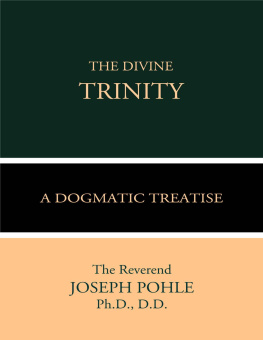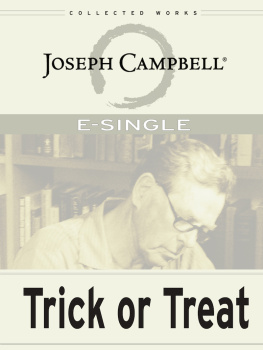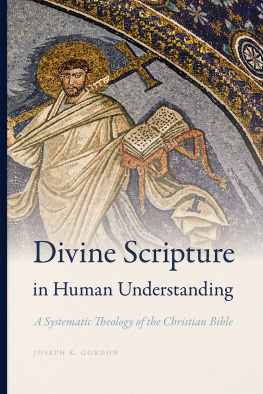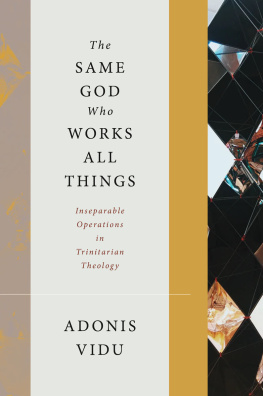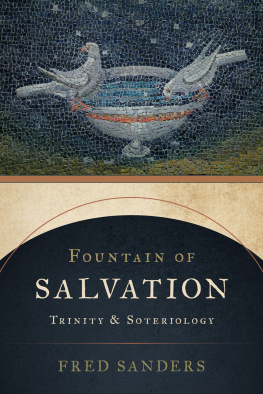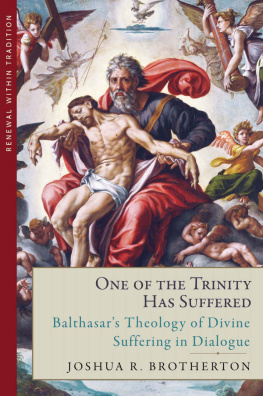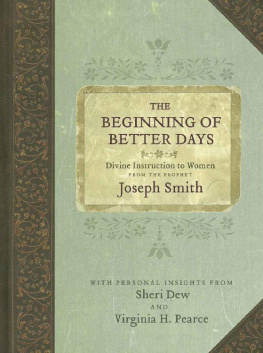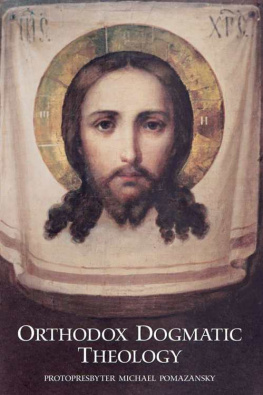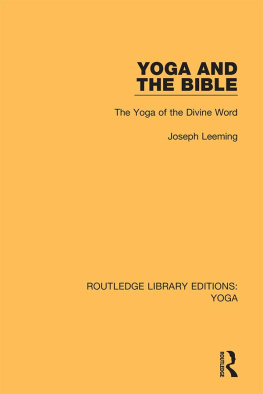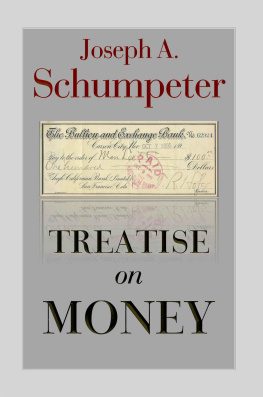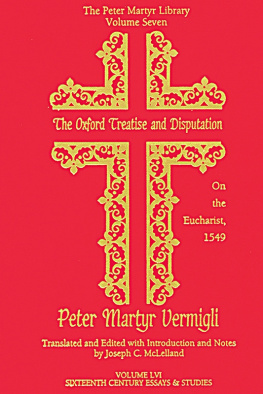Joseph Pohle - The Divine Trinity: A Dogmatic Treatise
Here you can read online Joseph Pohle - The Divine Trinity: A Dogmatic Treatise full text of the book (entire story) in english for free. Download pdf and epub, get meaning, cover and reviews about this ebook. year: 2019, publisher: CrossReach Publications, genre: Religion. Description of the work, (preface) as well as reviews are available. Best literature library LitArk.com created for fans of good reading and offers a wide selection of genres:
Romance novel
Science fiction
Adventure
Detective
Science
History
Home and family
Prose
Art
Politics
Computer
Non-fiction
Religion
Business
Children
Humor
Choose a favorite category and find really read worthwhile books. Enjoy immersion in the world of imagination, feel the emotions of the characters or learn something new for yourself, make an fascinating discovery.
- Book:The Divine Trinity: A Dogmatic Treatise
- Author:
- Publisher:CrossReach Publications
- Genre:
- Year:2019
- Rating:4 / 5
- Favourites:Add to favourites
- Your mark:
- 80
- 1
- 2
- 3
- 4
- 5
The Divine Trinity: A Dogmatic Treatise: summary, description and annotation
We offer to read an annotation, description, summary or preface (depends on what the author of the book "The Divine Trinity: A Dogmatic Treatise" wrote himself). If you haven't found the necessary information about the book — write in the comments, we will try to find it.
The Divine Trinity: A Dogmatic Treatise — read online for free the complete book (whole text) full work
Below is the text of the book, divided by pages. System saving the place of the last page read, allows you to conveniently read the book "The Divine Trinity: A Dogmatic Treatise" online for free, without having to search again every time where you left off. Put a bookmark, and you can go to the page where you finished reading at any time.
Font size:
Interval:
Bookmark:
The
Divine Trinity
A Dogmatic Treatise
by
The Reverend Joseph Pohle, PH.D., D.D.,
formerly professor of fundamental theology in the catholic university of america, now professor of dogma in the university of breslau
authorized english version with some abridgment and numerous additional references
by
Arthur Preuss
Second Edition
St. Louis, Mo., 1915
P ublished by B . H erder
S outh B roadway
freiburg (i./ b .) | london, w. c. |
G ermany | 68, G reat R ussell S treet |
Nihil Obstat.
Sti. Ludovici, die 12 Junii 1915
F . G . H olweck,
Censor Librorum.
Imprimatur.
Sti. Ludovici, die 12 Junii 1915
J oannes J . G lennon ,
Archiepiscopus Sti. Ludovici.
Copyright, 1911,
by
J oseph G ummersbach.
All rights reserved.
This edition 2019 CrossReach Publications , Kerry, Ireland

Hope. Inspiration. Trust.
Were social! Follow us for new titles and deals:
FaceBook.com/CrossReachPublications
Twitter Handle: @CrossReachPub
Available in paperback and eBook editions
Please go online for more great titles
available through CrossReach Publications.
And if you enjoyed this book please consider leaving a
review on Amazon . That helps us out a lot. Thanks.
The text of this book is in the public domain. All other rights
are reserved, including the right to reproduce this edition
or portions of it in any form whatsoever without prior
written consent from the publisher.
CONTENTS
The Divine Trinity
Introductory Remarks
1. It belongs to the first treatise of Dogmatic Theology ( De Deo Uno ) to show that God is one and personal. The pantheistic fiction of an impersonal God is sufficiently exploded by the Almightys own solemn declaration (Gen. 3:14): I am Who am.
Whether the infinite personality of God must be conceived as simple or multiplex, is a matter which human reason cannot determine unaided. On the strength of the inductive axiom, Quot sunt naturae, tot sunt personae , we should rather be tempted to attribute but one personality to the one Divine Nature. Positive Revelation tells us, however, that there are in God three really distinct persons: Father, Son, and Holy Ghost. This fundamental dogma, which essentially differentiates the Christian conception of God from that of the Pagans, the Jews, and the Mohammedans, is designated in the technical Latin of the Church as Trinitas , a term first used, so far as we know, by Theophilus of Antioch In the private symbolum of St. Gregory Thaumaturgus mention is made of a perfect Triad ( ). Didymus the Blind, Cyril of Alexandria, Hilary, Ambrose, and Augustine have written separate treatises On the Trinity.
2. Unity, simplicity, and unicity are as essential to the mystery of the Blessed Trinity as the concept of triunity itself. Hence it is not surprising that all these momenta were equally emphasized by the early Fathers.
Thus we read in the Athanasian Creed: a term which expresses the numeric unity of the Godhead common to all three Divine Hypostases. Both points of view are not only legitimate in themselves, but demanded by the nature of the mystery and the heretical distortions to which it has been subjected. As against those Antitrinitarians who (like the Monarchians, the Sabellians, and the Subordinationists) exaggerate the notion of unity so as to deny a true and immanent Trinity in the Godhead, Dogmatic Theology has to prove the existence of three really distinct Persons. In refuting the opposite heresy of Tritheism, which exaggerates the notion of threeness and postulates three separate divine natures, substances, or essences, it is necessary to show that the Divine Trinity is a Triunity.
3. Antitrinitarianism in both of its antithetical forms is by no means a thing of the past, but under various guises still has numerous adherents.
Whilst the few remaining partisans of Gnthers theological system continue to teach a sort of veiled Tritheism, present-day Socinians, Unitarians, and Rationalists move entirely within the circle of the heretical notions of Sabellius. Kantian Rationalism debases the mystery of the Most Holy Trinity by treating it as a mere symbol indicative of the power, wisdom, and love of God. The school of Hegel pantheistically explains the Father as das Ansichsein des Absoluten , the Son as das Anderssein des Absoluten in der Welt , and the Holy Ghost as die Rckkehr des Absoluten zu sich selber im menschlichen Selbstbewusstsein for the meaning of which obscure phrases we must refer the reader to the learned author of The Secret of Hegel . Schleiermacher does not deny the Trinity, but according to him it is such an unessential mode of existence of the Divine Being that he has acted wisely in relegating it to the appendix of his Glaubenslehre . The position of liberal Protestant theology at the present day is well stated by Adolph Harnack when he says: Catholic theology, which alone upholds the banner of true Christian belief, in asserting and defending the dogma of the Trinity finds it necessary above all to demonstrate by the modern scientific method that this dogma is truly and clearly revealed by God, that it is solidly founded in Christian Tradition, and that it does not, as unbelievers allege, involve a contradiction.
4. Since theistic philosophy is unable to establish this dogma on the basis of unaided human reason, the Catholic theologian is compelled to adhere closely to the teaching of the Church. He must first believe; then he may inquire .
The most perfect and complete Trinitarian formula that has come down to us from Patristic times is that composed by the Eleventh Council of Toledo, A. D. 675.
The chief points of our dogma may therefore be summarized thus: In essence, substance, and nature there is but one God. However, the Divine Nature does not subsist in one single Person or Hypostasis, but in three distinct Persons, i. e. , Father, Son, and Holy Ghost. The Three do not coalesce after the manner of mere logical momenta, but are really distinct from one another, so much so that the one is not the other. They are not distinct in virtue of their nature, which is numerically the same in all three, but solely in virtue of the relative opposition by which the Son is begotten by the Father, while the Holy Ghost proceeds alike from the Father and the Son. The mystery peculiar to this sublime dogma arises from the mutual relations of the two principal conceptsNature and Person. Within the domain of human experience every complete nature is at the same time a separate hypostasis; in other words, every rational nature is eo ipso a distinct person. Hence the axiom, Tot sunt hypostases, quot sunt naturae . But this axiom has no metaphysical value, and cannot be applied to God, since Revelation expressly teaches that Nature and Person do not coincide either in reality or in conception. As we acknowledge three Persons in the one Divine Nature, so conversely we believe that there are in Christ two complete natures, the one divine, the other human, both subsisting in one and the same person, i. e. , the Divine Person of the Logos-Son. This revealed truth compels Catholic philosophy to draw a sharp distinction between Nature and Person, as we shall show more fully further down.
Since the essence of the mystery consists in this that we worship one God in Trinity, and Trinity in Unity, we may consider the Blessed Trinity first as Trinity in Unity ( Trinitas in Unitate ), or threefold personality; and, secondly, as Unity in Trinity ( Unitas in Trinitate ) or Triunity. We shall accordingly divide the subject-matter of this treatise into two parts.
Next pageFont size:
Interval:
Bookmark:
Similar books «The Divine Trinity: A Dogmatic Treatise»
Look at similar books to The Divine Trinity: A Dogmatic Treatise. We have selected literature similar in name and meaning in the hope of providing readers with more options to find new, interesting, not yet read works.
Discussion, reviews of the book The Divine Trinity: A Dogmatic Treatise and just readers' own opinions. Leave your comments, write what you think about the work, its meaning or the main characters. Specify what exactly you liked and what you didn't like, and why you think so.

